#papal symbols
Explore tagged Tumblr posts
Text

Scudo con quercia e stemma papale, Basilica di San Lorenzo, Roma, 2019.
#coat of arms#oak tree#papal symbols#basilica di san lorenzo#roma#lazio#italia#2019#photographers on tumblr
7 notes
·
View notes
Text

Allegory of Vanity by Jacopo Ligozzi
#jacopo ligozzi#art#allegory#vanity#scales#power#death#sin#sins#skull#bones#papal tiara#tiara#crown#sceptre#god#arm#helmet#religious art#religion#christian#christianity#symbols#symbolism#europe#european#skulls#skeleton#mannerism#renaissance
149 notes
·
View notes
Text
Writing Notes: The Arcana Interpretations
symbolism for your next poem/story (pt. 1)
1. The Magician
The beginning, the first cause, Mercurial influence
Good: Dexterity, ability, diplomacy, eloquence, convincing ways, an alert mind, a quick mind, business acumen
Bad: A persuasive boaster, an illusionist, intrigue, careerist, politician, charlatan, imposter, liar, a crook, an exploiter; an agitator, a lack of scruples
2. The Priestess
Mystery, intuition, devotion, passive Saturnian influence
Good: reserved, discreet, quiet, meditation, faith, patient, religious feelings, resignation, modesty; necessary inaction
Bad: hidden intentions, dissimulation, hypocrisy, inaction, laziness, sanctimonious, holds a grudge, an indifferent disposition, interest in the mystical
3. The Empress
Prudence, discretion, idealism and intellectual solar influence
Good: Understanding, intelligence, instruction, charm, courteous, sociable, elegance, distinction, politeness; domination by the mind, abundance, riches; servility
Bad: Affectation, poseur, stylish, vanity, pretentious, disdain, frivolity, idleness, luxury, extravagant; sensitivity to flattery, lack of refinement, ways of nouveaux riche
4. The Emperor
Firm, positivism, executive power, Saturnian-Martial influence
Good: Right, rigid, certitude, fixed ideas, realization, perseverance, strong willpower, acts on decisions; powerful protector
Bad: Tenuous opposition, stubborn, hostile prejudice, opinionated, bad government, big risks of failure; tyranny, absolutism
5. The Pope
Duty, morality, conscience, Jupiterian influence
Good: Moral authority, respectability, teaching, good advice, goodwill, indulgent, generosity, forgiveness; meekness
Bad: Papal sentence, strict moralist, strict teacher, small-minded theorist, bombastic preacher; an adviser with a lank of practical sense
6. The Lovers
Feelings, freewilled, testing, double influence of Venus or more exactly Ishtar the war like star of the morning, then amorous as the stars go down
Good: Voluntary determinism, choice, wished, aspirations, desires; examinations, deliberations, responsibility; affections
Bad: To go through doubts and indecision; dangerous temptation, the risk of being seduced, misconduct, liberty, weakness, lack of heroism
7. The Chariot
Triumph, command, superiority, Martian-solar influence
Good: Legitimate success, deserved advancement, talent, health, aptitudes put to good effect; governmental tact, diplomacy, efficient direction, appeasement; progress, mobility, journeys on land
Bad: Unjustified ambition, lack of talent, usurped situation, illegitimate government, dictatorship, harmful concessions, dangerous opportunism, worrying about which way to go, preoccupations, overworked, feverish activity without rest
8. Justice
Order, regularity, method, equilibrium, placid lunar influences
Good: Stability, conservatism, organization, normal functioning; law, discipline, logic, coordination, adapting to necessities, moderate opinions, practical sense, reason, administration, economy, obedience
Bad: Bourgeoisism, submission to users, lack of initiative, slaving over books, functionalism, papers; police station; legal dispute, law suit, quarrel, exploitation of the legal system
9. The Hermit
Prudence, reserve, restriction, Saturnian influence
Good: Isolation, concentration, silence, profoundness, meditation, study; austerity, continence, sobriety, discretion; doctor, discreet occultist
Bad: Timid, misanthrope, mute, exaggerated circumspection, lack of sociability, sullen character; avarice, poverty, celibacy, chaste; conspirator
10. The Wheel of Fortune
Destiny, instability, lunar-Mercurial influence
Good: Sagacity, an opportunist, luck in all undertakings, luck, fortuitous success; spontaneity, an inventive disposition, liveliness, good humour
Bad: Carelessness, speculation, game, insecurity, unserious, the unexpected, gypsy character; unstable situation, sudden change, winnings and losses; adventures, risks, minor fortune
11. Strength
Virtue, courage, Jupiter-Mars influence
Good: Moral energy, calm, intrepid; mind over matter; intelligence conquering brutality; subjugation of passions; success in industry
Bad: Anger, impatience, immoderate enthusiasm, insensibility, cruelty, fighting, war, conquering with violence, a surgical operation, vehemence, discord, fire
Source ⚜ More: Writing Notes & References ⚜ On Tarot
#tarot#major arcana#writing reference#writeblr#dark academia#spilled ink#writing inspiration#writers on tumblr#literature#writing prompt#poets on tumblr#poetry#fantasy#writing prompts#creative writing#lit#light academia#writing ideas#writing resources
208 notes
·
View notes
Text
things i noticed when watching conclave for the second time:
the late holy father's removal from the premise is shown on screen intertwined with the sealing of his chambers, which happens as he is zipped up, showing that part of him remains within these walls
additionally, while he's about to seal the room, the gurney with the late holy father on it is shown over his shoulder, as a show of what overlooks him and steers him throughout the movie
after the explosion, benitez has a small wound on his forehead, i suppose referencing the crown of thorns
the cardinals have black umbrellas when they arrive to santa marta, symbolizing mourning, but when they descend through the gardens to the sistine their umbrellas are white, the color of purity and of the pope's clothes, possibly i would want to see that as reminiscent of angel wings also?
the cardinal without an umbrella seems indeed to be lawrence, leaving him exposed to the rain (as he is weathering the tumultuous events of the conclave) but also open to the sky (the heavens, the message of god)
the screenplay does mention that he opens his umbrella and that the other cardinals follow him before that shot, but i don't remember that so who knows maybe they deleted it maybe my memory's bad
when talking to bellini and evaluating the papal clothes (the scene with the joke about john paul II), lawrence sits down in front of a red wall and the color is so vibrant that it melds with his little hat thingy. at the same time he is part of the walls of the vatican as functional like they are, and he is shown visually with a huge chunk taken out of his head like a bleeding wound, showing how open he is spiritually to anything that comes from above, but also how much pain it necessarily brings him
i still don't know what the late holy father's bedside table means
EDIT:
Multiple times throughout the movie, the cord worn around the neck (sorry I don't know the terminology) can be interpreted as a noose and/or a leash in the many shots we get of the back of Lawrence's head, but especially the first time he writes down his own name there's a shot from above with his head right at the center of it that really emphasizes the pressure of the decision and the judgement he feels, and I think that cord helps symbolize that
55 notes
·
View notes
Text

François Gérard, after (French, 1770-1837) Saint Teresa of Avila, 1827 Infirmerie Marie-Thérèse Saint Teresa of Avila (1515-1582) was a Carmelite nun born in Castile during the sixteenth century. In her writings Teresa recorded a vision of an angel plunging a long golden spear or arrow with a flaming tip into her heart. This symbolic implanting of amor dei was mentioned in the papal bull of her canonisation (1622) and became the most popular motif in representations of the saint after this date: the most famous of these is undoubtedly Bernini's marble sculpture in the church of Santa Maria della Vittoria, Rome.
#spanish nun#saint teresa of avila#aragon#carmelite nun#castile#st teresa of avila#François Gérard#French#France#1700s#1800s#saint#sainthood#christian#christian art#christianity#christentum#catholic#catholic art#catholicism#roman catholic#cermelite#medieval#spain#spanish#st teresa#western civilization#art#europe#fine art
126 notes
·
View notes
Text

“The Path is in yourself, and Truth is in yourself and Mystery is in yourself.” -The Symbolism of the Tarot by P.D. Ouspensky (1913)
V. The Hierophant Talon Abraxas
Significations of The Hierophant
The Hierophant has also been called The High Priest , Spiritual Father, the Abbot, and the Pope. Its correspondence, the High Priestess, is the Abbess or Mother of the Convent. Both are arbitrary names as the insignia of the figures are clearly papal. It stands to reason that the High Priestess is, and can be only be, the Church to whom Pope and priests are married by the spiritual rite of ordination. I think, however, that in its most primitive form this card did not represent the Roman Pontiff.
The Hierophant card has been commonly name The Pope, which is a particular application of the more general office that he symbolizes. He is the ruling power of external religion, as the High Priestess is the prevailing genius of the esoteric, withdrawn power.
This card has suffered from woefully mixed meanings. Grand Orient accurately says that the Hierophant is the power of the keys, exoteric orthodox doctrine, and the outer side of the life which leads to the doctrine. He is not, however, the prince of occult doctrine. The Hierophant is rather the sum of all known spiritual learning, in it’s most rigid expression. He also symbolizes all manifestations of the righteous and sacred. He is the channel of grace belonging to the world of institution as distinct from that of Nature, and he is the leader of salvation for the human race at large.
He is the order and the head of the recognized religious hierarchy, which reflects a greater hierarchic order. There may be times when the pontiff, or bridge-builder, forgets the significance of his symbolic state of being. This will cause him to act as if he contains, within himself, the total sum of divine understanding. The Hierophant does not symbolize philosophy (except theologically). He does not represent inspiration. Most importantly, this figure does not represent religion itself, although, he is a mode of its expression. -Modern Translation of The Pictorial Key to the Tarot by A.E. Waite (1910)
Significations of The Hierophant
In The Divine = The reflex of the Will; Intelligence In The Human = The reflex of Power; Authority, Religion, Faith In Nature = The reflex of the soul of the world; The Universal Life
33 notes
·
View notes
Text
Fun Fact! Crosses!
I am not around, this is a queued Fun Fact! Don't send me requests! I won't see them!
Easter is coming up, so let’s talk about different kinds of crosses! You’ve probably seen most of these before, especially if you’re Catholic, but maybe you didn’t know the names!
Of course, most Christians are familiar with the Latin Cross:

That’s the classic one, of course.
The Greek Cross, with equal lengths on each bar:

Also a classic!
The Patriarchal Cross, which you see a lot in Orthodox churches:

The extra bar towards the top represents the ‘INRI’ sign Pilate posted on the Cross.
The Papal Cross:

I’m not actually sure what the deal with that one is.
The Chi Rho:

This takes the two Greek letters, ‘Chi’ and ‘Rho’ (first two letters of ‘Christos’ in Greek), and combines them.
The Jerusalem Cross, used in the Kingdom of Jerusalem in the Crusades:

I *believe* it represents how Jerusalem was believed to be the center of the world, and the crosses in the corners represent the four corners of the world? I think, anyhow.
The Tau Cross:

Also called Saint Anthony’s Cross, as it’s associated with Saint Anthony of Egypt. It’s also got Franciscan associations!
Cross of Saint James:

Big in Spain, obviously, where Saint James the Greater is quite popular. It’s the symbol of the Order of Santiago (Saint James).
Celtic Cross, which you see a lot in Irish stores as knick-knacks, though they’re also from Scotland and Wales:

Obviously modeled after those stone crosses you’ll see carved in the British Isles.
The Ankh, which Coptic Christians sort of grabbed from Egypt:

This was originally an Egyptian symbol for ‘life’, unrelated to the Cross as we know it in the original context.
The Maltese!

The symbol of the Knights of Saint John and the Order of Hospitallers! And obviously, the island of Malta.
And the Marian Crosses:


It combines the Latin Cross with the letter ‘M’, to emphasize how Mary was at the Crucifixion.
Hope this was something that you didn’t know!
121 notes
·
View notes
Text
HI. IT'S ME AGAIN. YA BITCH. AND YOU KNOW WHAT THAT MEANS. OH YEAH WE'RE TALKING ABOUT GHOST COSTUMES.
Well... One Ghost costume in particular. Because I've talked at great lengths about how the costumes are made and what they're made out of but I haven't talked much, if at all, about the inspiration behind them. So today we're gonna take a look at Papa's Kaiserion costume.
Impera, Ghost's fifth studio album, builds itself on the themes of the rise and fall of empires. Kaiserion, the first song of the album with lyrics, leans heavily and explicitly on those themes. It makes sense, as being also the first song played live during this era, that Papa's outfit would reflect that empirical meaning.
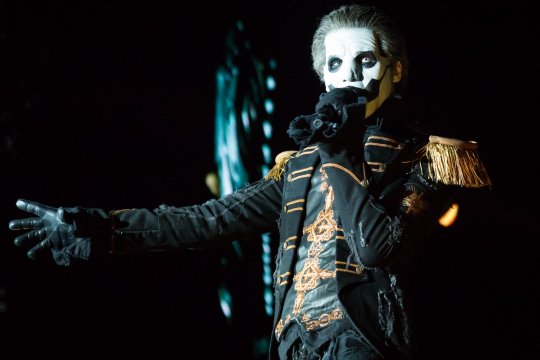
Copia has always been so interesting to me in terms of stage costumes as he never really tried to fit into the role carved by his predecessors. The band's image, before Terzo was relieved of his Papal duties (and his head), relied on Satanism and depicting themselves as an opposite for Christianity. Taking inspiration into religious costumes and giving them a stylish twist à la Satan. Terzo started this trend of diverging from this image but he only had one stage outfit that wasn't his robes. Copia has had several from the very start.
This one costume is no exception. You will find Satanic and occultist symbols in the embroidery on his vest but it's not trying to be a religious garment in any way, shape or form. It rather reminds me of French military uniforms from the late 1700s to the late 1800s.
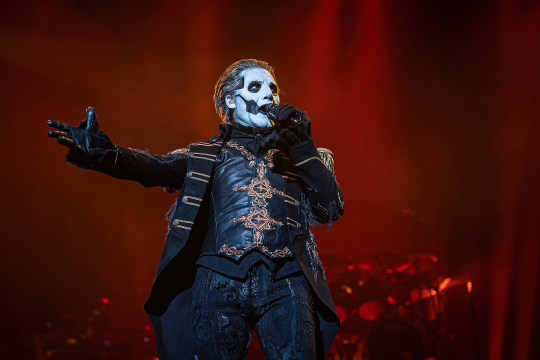
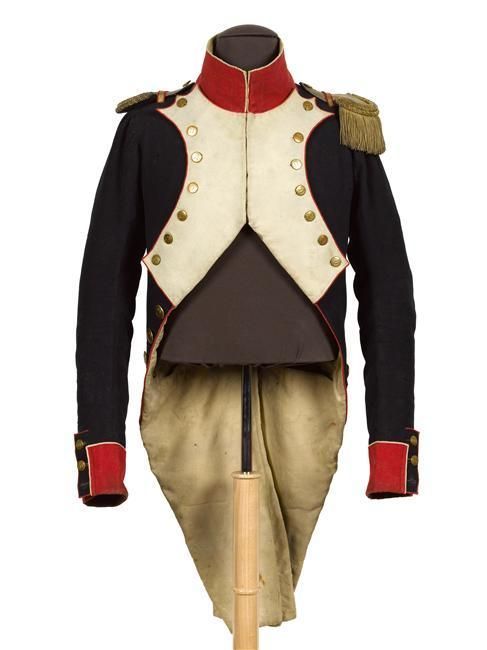
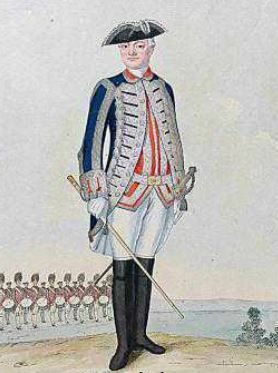
Obviously it's not a perfect replica of any historical uniform but I still find the comparison fascinating and I have a deep appreciation for the imagery it creates. It leads us straight into the atmosphere created by the song and it infers on Copia a sense of authority fitted for the meaning of the album. For the span of those 5 minutes of the concert, he's not just a spiritual leader, he's a ruler commanding an army.
That sentiment is aided by one of my favourite details. Epaulettes were often used to mark stature on uniforms. Not only if you had them but what they looked like. You didn't think I was gonna make a whole post about Papa and not mention the ghouls once, were you?
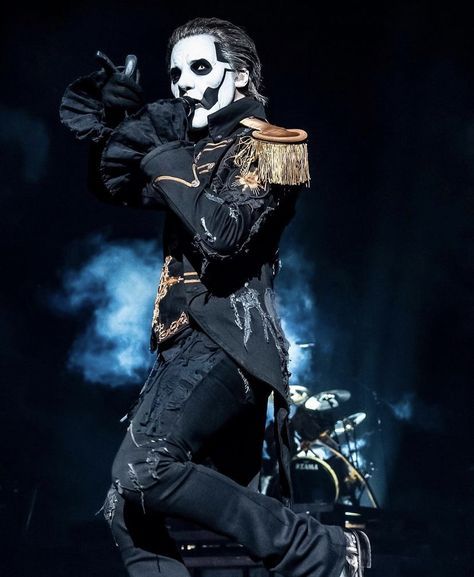
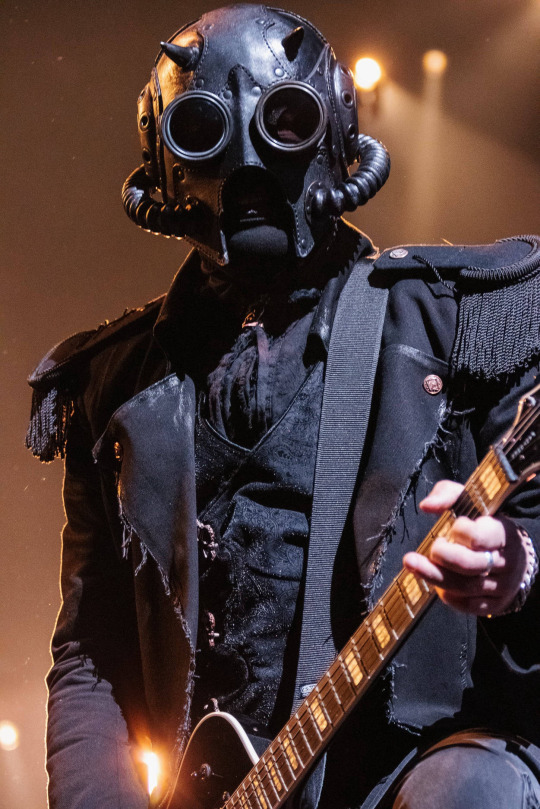
Not only is the overall construction of Papa's jacket made to be more imposing than the ghouls, his golden epaulettes imply a greater status, a higher rank.
I would also like to point out the state of the jacket. Which of course, matches the decrepitude of the pants he wears for the entire concert. To me, it implies a meaning hidden in the concept of the album itself. The military inspired jacket paints him as a commander ready for conquest, ready to go to war for him Empire. To me, all that intentional distressing says "this is what it'll look like once we fall, this is what it'll look like when the Empire fails."
All of this really makes me question the fate awaiting Copia now that this era is over. "The empire has been built." it feels like half of the prophecy fulfilled. We're yet to see it fall, but the fall was promised.
Aight didn't mean to get all ominous on ya at the end but oh well 😅😅😅 that's all for me today! Thank you and good night!
#the band ghost#ghost bc#papa emeritus the fourth#papa emeritus iv#papa copia#copia#impera#impera era#meerkat talks about ghost costumes#nameless ghoul#nameless ghouls
139 notes
·
View notes
Text
Deus in Absentia and Terzo.
You know, I really like Deus in Absentia, It's a great song. It's a shame that Terzo only sang it twice... But... What if there is something more behind that?
What if it's actually Terzo's ballad upon his retirement?
One thing I like is that the song addresses the moral and spiritual decay of humanity, as well as the absence of God or a higher power in times of crisis or corruption.
The lyrics explore themes of perdition, chaos, and the inclination toward evil or sin, reflecting a world where people have abandoned faith or been forgotten by the divine. Musically, I LOVE it; the song has a grandiose and dark atmosphere, with choruses that give it an almost apocalyptic tone.
In the context of Ghost, they use these themes to explore the darker aspects of religion, faith, and humanity, which is recurring in their compositions, blending social criticism with an almost satirical narrative about the power of religious institutions.
In summary, the song is about the void left by the absence of divine guidance in a corrupt and chaotic world.
As I said before: Terzo only sang it twice. Once at a concert in Sweden and then the concert right after that, which was the following day.
Which concert was that?
The concert where he was dragged off the stage.
It’s interesting that Terzo only performed it at his last two concerts, as this could symbolize something deeper within Ghost's narrative.
Terzo, in his character, represents a figure of decadent power, a charismatic leader who is ultimately replaced due to his downfall. Deus in Absentia, a song about the absence of the divine and moral corruption, could be seen as a sort of swan song for Terzo, marking the end of his reign. The fact that he only performed it in those final concerts suggests a symbolic closure, both for the character and for the era he represented.
Terzo, with his extravagant and worldly character, is replaced by Copia, reinforcing the idea that his time has ended, and the song acts as a final commentary on the decadence and fall of his power. Narratively, it could be a reflection of the death or "absence" of his papal figure, aligning perfectly with the concept of the song, as if Terzo himself embodied that absent divine figure in his farewell.
As if Terzo himself was giving a ballad to the to the loss of his power.
#ghost terzo#cardinal copia#i love terzo lore#papa iii#papa terzo#papa iv#papa copia#ghost band#deus in absentia#meliora#meliora era#I can't stop yapping about this thing
22 notes
·
View notes
Text
Solomon/MC - the Pope of Hell
C/W: religious theme, spoilers of the main story up to chapter 5 of the main story.
Note: calling Solomon "Pope of Hell" doesn't mean his dynamic and relationship with the devils are exactly the same with the relationship between the Pope and other Catholics. The same applies in the case of MC, who is Solomon's successor.
To begin, after reading the main story, I started to notice some interesting similarities between the Pope and Solomon, enough to make me write this post from the sentiment of my religious heart.
I. The Keys

Christ Giving the Keys to Saint Peter, fresco, Pietro Perugino, 1481-82.
Thou art Peter, and upon this rock I will build my church; and the gates of hell shall not prevail against it. And I will give to thee the keys of the kingdom of heaven. And whatsoever thou shalt bind upon earth, it shall be bound also in heaven: and whatsoever thou shalt loose upon earth, it shall be loosed also in heaven. Matthew 16:18-19 DRB
So we have Christ giving Peter the keys to the kingdom of Heaven. From this very Scripture verses comes the well-known symbol of the Papacy, two crossed keys, one gold and another silver, under the triple tiara. The silver key symbolizes the power "to bind and loose" on earth, while the golden key symbolizes the power "to bind and loose" on Heaven.
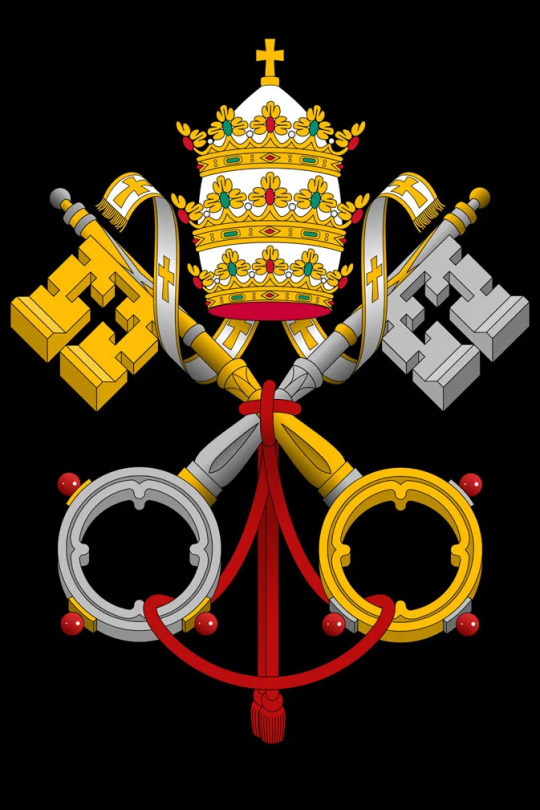
Now returning to the lore we are given in the game. It's mentioned that Solomon had 2 "Keys". One Lesser Key he left in Hell, and one Greater Key crafted by God.

Chapter 4, Stage 29 - the Holy Grail of God that Betrayed God
So I began to make a connection between the two images. The Lesser Key with St. Peter's silver key, which symbolizes papal power and authority on earth, which is lesser than Heaven; and the Greater Key with the golden key, which symbolizes papal power and authority on Heaven, which is the greater of the two.
Yes, the devils did mention a "third Key". However, they were only making a hypothesis on Solomon's disappearance. And given the likely reality that Solomon is physical deceased after his disappearance, the third Key probably doesn't exist and there are only two Keys. The fact that there are two key currencies in-game solidifies this theory, at least for now.
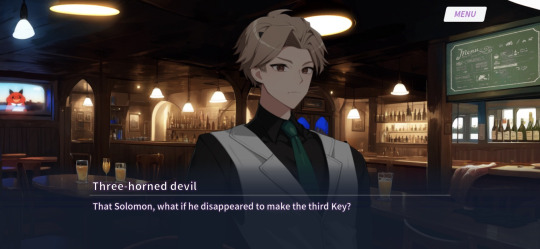
Story 4-29
II. The Power to Crown the Emperor
In the game, we know that at the end, MC has to choose one devil among the Seven Deadly Sins and 72 nobles and makes him the "Emperor of Hell", "the king of kings", "the Final Temptation" who will rule all of Hell.
"With your own hands" make me thing MC has to literally put a crown on the head of the devil whom they chose. But that's just my personal theory.


Chapter 1, Story 45 - the Contract is Broken
Now return to history, in the Medieval Age, kings were crowned by a bishop/archbishop of a prominent see in his country on their Coronation Day. However, there's one monarch who has to be crowned by the Pope. That's the Holy Roman Emperor.
Before being crowned by the Pope, the Emperor could not style himself as "Emperor", but only a "king", the exact title being "King of the Romans". Only after the Pope put the imperial crown on their head did the Emperor call himself "Holy Roman Emperor". This remained the case until 1508 when Pope Julius II permitted Maximilian I to use the title "Emperor Elect" with coronation by the hands of the Pope. Before that, like his predecessors before coronation, Maximilian I was only styled "King of the Romans". Even Napoleon knew that and had to get the Pope to officiate his coronation as the Emperor of the French, even though he raised the crown on his head himself.
The difference lies in the fact that unlike the Emperor of Hell, who will rule all the 7 nations of Hell, the Holy Roman Emperor in real life didn't have the power to rule other independent kingdoms in Europe, like France or England. However, being the Emperor, he was the most prominent Catholic monarch across Europe. Still, I believe I have proved the similarity here: Pope crowned an Emperor, MC will also crown one.
III. Tongue
The third similarity I see lies in the traditional way of how Catholics received Holy Communion (or the Eucharist), which is receiving on the tongue. And to do that in a correct way, Catholics need to kneel down and stick the tongue out a little bit.
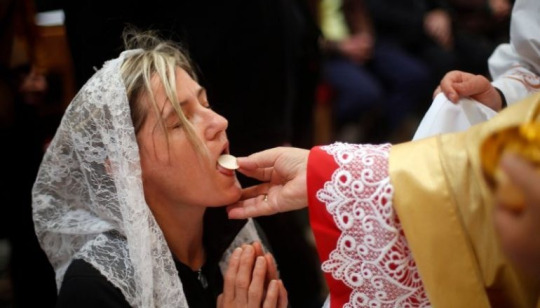
Maybe it's just me but when I saw the CGs where MC break the contracts with the devils. I immediately thought of this image because I saw some similarities.
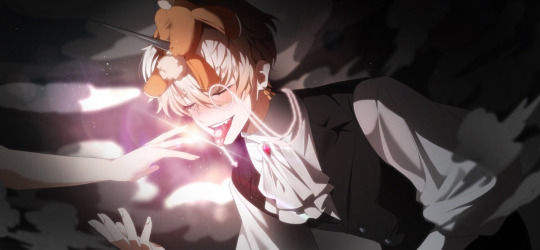
To have their contracts broken, the devils also kneel down and stick their tongues out. And if they stick their tongues out to break the contracts, could it be possible that when they first made contracts with Solomon, they also knelt down and stuck their tongues out to receive the pattern, just similar to how Catholics receive the Eucharist in the traditional way?
IV. Relationships with two powerful sides
In the fourth century, the Roman Empire converted to Christianity and gradually abandoning paganism. The Byzantine Empire was the successor of this great empire. The Byzantine Empire was Christian throughout its history. However, on more than one occasions, this empire showed disrespect and even violence to the Pope, the Head of the Christian Church, whom they were supposed to protect and honor. One Pope, St. Silverius was even murdered by the Byzantine conspiracy. Slowly, the Pope knew he couldn't trust or rely on the Byzantine anymore, so he sought help from the Frankish, whose king was Charlemagne, and Charlemagne's successor was the Holy Roman Emperor.
In a similar way, we have the powerful angels hating Solomon for gaining God's favor. They even tried to kill all of his descendants, including MC. As God's messengers and servants, they should have been the ones to protect Solomon and his descendants, but they did the contrary. Now to survive, MC has to rely on the other powerful faction, the devils.
So,
Solomon and MC mirror St. Peter/the Pope/Papacy
Angels mirrors the unfaithful Byzantine Empire
Devils mirror the Frankish/Holy Roman Empire and other Western European kingdoms, by allusion
Another point is that just like the historical relationship between the Pope with the Holy Roman Empire and other Western kingdoms, the relationship between MC and the devils is not always smooth and well. Mammon once thought he was MC's owner at first, just like how kings and Emperors of the West thought they could keep the Papacy under their control, or Leviathan and his Hades nobles kidnapping and trying to kill MC, just like how the Pope was a prisoner and had his life endangered by a particular Western kingdom for a long time and on more than one occasions.
Well, that's all to my ramble (possibly being delulu like Sitri) but thank you for reading it all to the end :3
#what in “hell” is bad?#prettybusy what in “hell” is bad?#what in hell is bad#whb#whb solomon#whb theory#whb mc
111 notes
·
View notes
Text
Take Me to War - Chapter II: Humbly beg the death upon my knee


Part I
Summary:
Cecily-Anne awakes in Ser Gwayne's tent and must come to terms with where she is in this new world. It is within it that she will come to form a new friendship and realize the depths of her grief.
TWs: Suicidial idealization, grief, child death, incest mention, abelism, mention of rape (though not committed)
Tag list: @lordbettany @fauxraven @rmelster
Cecily awoke to the clanking of chains.
Chains, which by all accounts snaked around her wrists. Jangling them did nothing except force her to realise how tightly she was bound. In short, she was not a noblewoman kept here for her safety, but a prisoner. The thought and realisation filled her with fear. As a highborn woman, she was protected by a social code of purity - had she come through that cut wearing a serving woman’s gown, the horrors would be inconceivable. But seemingly on part of her fine dress of black velvets and wolf fur, she had been spared such horrors - for now. Raising her head, Cecily found her snood that held her hair back to have been torn off. Her braided coiffure tumbled down her shoulders. She had been tied to some sort of central tentpost and rested upon a woven rug bearing the image of a tower with green flames bursting from its roof.
Studying it, Cecily felt confusion rise in her. Not once at any point had she seen someone’s family heraldry bear such a symbol. As an avid studier of heraldry herself (Her own being the white stag of Richard II on an emerald green backing with ivy leaves at its feet). Lifting her head, she could hear the sounds of men carousing and making merry. Evidently the battle must have gone in their favour, perhaps?
As Cecily looked about once more, she noted the candles flickering in their sconces, settles upon which furs and rugs had been thrown to make a more comfortable space. A mirror and washbasin with a finely carved jug sat nearby. The mirror was a cut of fine glass backed (she assumed) in silver, and bore gold detailing. Whomever’s tent she was in was certainly wealthy. As she shuffled in a circle around the pole, Cecily noted the bed and its posters laid with yet more imagery of the same tower below her feet. She could only guess at the kind of fabric the bed-curtains were, though she assumed either satin or velvet. Cocking her head to one side once more, she heard the sound of two men arguing in what sounded like English, though it was certainly more heavily accented. A Northern twinge to it. Hope stirred in her chest, which she frantically squashed. No good Yorkshireman would ever have the daughter of the Lord of the North tied up like some common ne'er do-well. The tent flaps (made of stiffened oilcloth dyed deep green and edged in silver with goldwork thread made out to be tiny flames) parted and two men stepped in. One was more weary than the other, with dark hair and eyes. He carried a bottle of wine or spirits, which he uncorked and took a generous swig of. The other man spoke little, and as his shadow of a valet stepped into the room followed by squires of the body, Cecily watched.
“What do we do with her, then, Ser Hightower?” The man hissed as he drank. The other - Ser Hightower, shrugged. Cecily froze as his eyes flitted to her, and she noted his age. Young, he was. Perhaps about ten-and-seven if not a year older. A knight, then? Of which order? She saw no familiar garter-belt about him or mantle-chain of office. He certainly wore spurs, yet not of gold but of burnished silver. Across his front of his chestplate was that same tower, and the name stuck.
Hightower. His name was of a noble family. Unlike Cecily-Anne who held no legal last name, she could say she was of House Plantagenet. Through both sets of her family, thanks to her parents being first cousins and ensuring a papal dispensation was needed to wed. Shaking her head silently, Cecily turned back to half-watching as the body-squires and barbers tended to this Ser Hightower.
Was he a poor knight then? No, his tent could not have been so lavishly furnished as such. Perhaps he was someone who preferred his material comforts over his godly ones. She wondered if he prayed as much as he ought to. What surprised her was no signs of crucifixes or depiction of the mother Mary or Holy Host. In fact, no priest had come to take Compline with the men or offer the Host in mass. Perhaps it was not yet Sunday. She did note however seven small figures in an alcove of the tent over which a glass image hung of a star with seven points.
“Have you no priest?” She spoke at last, coughing it out. Both men wheeled to look at her.
“W-what?” The first man asked. Cecily ignored him, holding Ser Hightower’s gaze.
“No, no Septons have been on this expedition, My lady.”
Well at least he is not calling me a wench. Delightful. I wonder how this other man is faring, seeing as he is deep enough in his cups to call about a guard.
“Septons?” She replied. “Of what order of clergy is a ‘Septon?’ “ Cocking her head again, Cecily sniffed. “One of the friars?”
“Nay, My lady.” Ser Hightower spoke again. “They are of our priestly order and raise poor boys to follow the faith.”
“So they do be priests.” She raised a brow. “Have you nuns?”
“Septas.” The other man coughed. “My lady.” He added after a long, cold pause. Cecily hungered to ignore such a slight, and settled herself back against the pole. “Tell me your conditions of capture, please.” She raised her head to glare at both men.
“C-conditions of capture?” The other man murmured.
“We have no reason to view you as a prisoner, M’lady.” Ser Hightower spoke. “These ropes were to keep you from getting up and further injuring yourself.” He signalled to a squire who slashed through the ropes holding Cecily in place, and stepped back. Cecily rose to her feet unsteadily and gripped the tent-pole for support. Somehow, this did not feel right to her eyes and ears. Women such as herself in positions of little to no power when left with monstrous men, were often raped openly and if not that, brutally wounded, sold into slavery or worse evils. While she was Highborn as she had reminisced on earlier, her household did not exist in this place. She could not simply claim to be of some family either, seeing as she knew none of them.
“Leave us, Ser Cole. I have reason to speak to the lady alone.” Ser Hightower spoke to the other knight, who nodded. As he passed her, he turned his head and spat at her feet. Cecily’s hands balled into fists and she nearly moved to punch him. However, barely it seemed, she stayed her hand.
As soon as Cole was gone - Cecily would have to watch her back - she found herself faced with Ser Hightower. The knight took a seat upon a settle piled high with furs and leaned one of his elbows on his portable writing desk. His emerald green eyes stared at her, and Cecily sat herself on a cushioned pouffe. Glancing down, she found her skirts to be torn and the velvet edging frayed.
“Once we reach King’s landing, I shall have my steward fetch you new clothes. There is a place near the port that sells very fine fabrics.” Hightower turned to his letter and Cecily shifted forward. She did not watch him per-se, but she was curious to see the writings of his hand in this foreign place. It seemed as though the people spoke English, but there was an accent to it that she had noted earlier.
“Oh..” She paused. “Thank you.” She inclined her head. Where was he going with this? She was only ten-and-five, he was ten-and-seven years. A proclamation of marriage had not been offered, at least not yet. Knights of noble households did not take strange women into their care. Perhaps he meant to replace her wardrobe before having her packed off to… a nunnery? She shuddered at the thought. Although there was none of her family left, she hoped to God that her grandmother would at least be going a little mad on her behalf.
The idea of Gran-mére Cecily tearing apart that nunnery for her brought Cecily-Anne the first relief she’d felt in days. She half expected the old woman to come charging through the tear she had stumbled through and rescue her.
Sadly, that would not be the case. As soon as the letter had been dispatched to a place known as Oldtown, Cecily was re-shackled (for her safety according to Ser Hightower) and “gently” escorted from the tent by him to a waiting carriage on four wheels that looked nothing like any litter Cecily had ever sat in. Long, grand and consisting of no windows - which made her wonder what the blasted thing was like in summer - Cecily was put inside at once, her chains unshackled and dumped onto a soft bed of satin in that same deep green as everything else. The wood inside was dark oak with pearl inlay and heavy curtains were kept apart by splendid cords of gold.
Seated across from her was a woman, with white-blonde eyebrows and arresting violet eyes. Drenched in the same green as the curtains and bedspread, she almost seemed to disappear into the fabric. The door opened again and Ser Hightower stuck his head in.
“Apologies, Your Grace. This is the lady I wrote to you of. Her name is…”
Cecily swore under her breath. The bastard had not asked her name!
“Cecily-Anne, Duchess of Gloucester.” Cecily rubbed her hands together. And princess royal, lady of Middleham, etc. She added silently to herself.
“Lady Cecily-Anne.” The woman spoke, inclining her head. She had a nervous air to her, but one not unfriendly or unkind. Cecily noted her hair tucked into a heart-shaped hennin adorned with a crown of gold and emerald stones.
“I am Queen Helaena Targaryen. Ser Gwayne; my uncle, has elected you to be my lady in waiting…. As my family believes I am no longer able to care for myself and require more proper… feminine company.”
Her slow way of speech would have concluded to Cecily that this woman was slow or stupid, had she not been much the same. Cecily gave a gentle smile in return and inclined her head.
“I thank you for this acceptance, your Grace.”
Reaching across the expanse of space, Helaena squeezed Cecily’s hands tight in her own and gave the other woman a beaming smile. “You are the first light of life I have felt since my son was killed. Please, call me any name you so wish.” Helaena giggled, the grief in her eyes fading a little with each passing moment.
At that second, the wheels of the litter jerked into motion and they were off. From the patterned lattice screens surrounding the litter - or wheelhouse as Cecily learned it was called - she began to see Westeros in all of its late summer glory. Gwayne and his retinue of knights accompanied the carriage on its slow procession from the battle of Rook's Rest back towards the capital. To pass the time, Cecily found herself falling into the role of ladies maid as Véronique de Crécy had been to her mother, with ease. Helaena was an easy soul to charm and adored nothing more than kindness and attention. Her fascination with bugs and propensity to say the most hilarious things off the cuff had Cecily relaxed within moments. Cecily delighted in showing off her new gowns that were going to be sent, and listening to Helaena speak all about her children and her dragon, Dreamfyre.
“Do Targareyens really place a dragon egg in the cradle of their babies?” Cecily breathed as she and Helaena sampled a picnic lunch packed by one of the cooks. She simply couldn’t believe that dragons existed, and that the lady she was now serving had one as her steed!
“Indeed.” Helaena replied with shocked cheerfulness. “Do you not have dragons where you are from?”
“Nay, they’re just stories.” Cecily answered as she bit into a hard-boiled egg smeared with summer mustard. She examined the grapes on her platter, dark purple ones with a seductively sweet bite when chewed. “Are these not for wine?” She examined them in turn.
“Yes, but they’re my favourites. Aegon says I have a confuddled taste and concedes it is due to something happening before I was born.”
“And Aegon is…?” Cecily paused in sipping her wine.
“My brother.” Helaena responded as she smeared more preserves onto her bread slice. “And my husband.” She added as Cecily bit into her selection of preserved salted pork. Cecily coughed, half bent over as she struggled to process the words she was hearing.
“By the saints!” She breathed. “I-is that not violation of some rule of incest your…” She paused. “My parents were first cousins, but the idea of my father marrying my aunt…” She shook her head. “How does your church not think it sinful?”
“The Seven turned a blind eye to it.” Helaena explained. “It is… strange. He is my brother and I have born him three children and lost one. Yet, I know naught else. My mother who you shall meet as soon as we reach the Red Keep married the king. Her father was the king’s right hand and she was only ten and five at the youngest!” She bit down on a pickle as she spoke and winced at the sour taste. “Eugh. Aegon says these are good for my health. I detest them.”
“May I?” Cecily asked, holding out her hand. The jar of pickles was passed to her and in reciprocity, Cecily handed Helaena the stewed plums. She hated plums with a passion and gobbled up the pickles. All of this was washed down with sweet wine sweetened with strawberry syrup. For afters were sugared violets and little balls of fried dough filled with flavoured preserves.
It seemed like no time at all before they were back on the road and rolling over more of the dirt-packed and stone-riddled expanse of Westeros. “What reason is there for such large carriages?” Cecily asked as she watched the candle-lamp swing from side to side. A darkening sky heralded a storm with the crack of lightning. The sight of it flashing across the heavens reminded Cecily of an earlier time, another place where she had sat in her bedroom window up in the western tower of Middleham Castle. Rubbing against her arm then had been Ned, her dark haired, freckled twin. He had clutched her hand tight in his and the two of them had held their breaths.
Their father had said that if one counted the time between the flash and bang of thunder, they could determine the location and direction of a storm. Then, there had been the waiting period and the yelps of joy both of them had let out when the proverbial bang did come. The flash of lighting across the night sky that one summer where Ned hadn’t been as sickly had made his dark eyes turn milk-white. It was as if the stars they had loved to create constellations of their own had taken her brother’s soul for a single, shining moment.
Then those stars had faded, gone out like candles in the night. He was up there now, dancing amongst those beautiful, alien lights. Him and Maman and Papa. And Cecily was down here, stuck somewhere between Heaven and Hell. She pressed her hands to her forehead and began to weep.
“Oh..” Helaena breathed. She had settled down for the night with her pet snake, which she now replaced in its basket and crept over to Cecily. “What is it? Did the lightning frighten you?” She asked, her voice so maternal and soft that Cecily only wept harder. Fetching a blanket from the bed, Helaena drew the material around Cecily’s shoulders and pulled it tight, then leaned against her.
“I noticed you do not like to be touched. Neither do I. I think this should help.” She explained. Cecily sniffled, and reached her hand hesitantly towards Helaena, who after a moment, gave it a bone-crushing squeeze. “My mother, father and twin brother are all dead.” She confessed in a whisper. “I was reminded of them with the lightning storm.” She hiccuped. “My father died only ‘ere this morn, and my mother went this past April. My brother went in the winter. He was only ten.”
“You said you are ten-and-five, yes?”
“Yes.” Cecily coughed.
“I am truly sorry for your loss, sweet girl. W-when women like us know loss such as this at such young ages, it can be difficult to bear. My son Maelor was murdered in his cradle by assassins. I was forced to choose between him and his older brother.” She squeezed Cecily’s hand again. “I wonder often if the Seven do wish to test my faith and my love for my children with such horrors. I have wondered also why I do not go mad. You must be too.” She looked into Cecily’s eyes and the other woman recoiled in understanding.
“Y-yes.” Indeed, Cecily did wonder why she had not gone mad. Some days it felt like a good, merciful thing to do. Allowing herself to go mad would have meant her father could put her away somewhere. It would allow her a quiet death at her hands or the ones of her guard. Yet the church said to take one’s own life was sin. Did God not look upon her and Helaena and understand their pains? Was this just one test in many they were set to face?
Another flash of lightning, another boom of thunder. The door to the wheel-house opened and Gwayne poked his head in. In the low candlelight with the two women wrapped in blankets, he swore they looked like witches come to cast some spell upon him and this country.
“Your Grace.” He inclined his head. “My lady. We will be stopping for the night on account of the weather. The wheelhouse will keep you dry.” He nodded at Cecily. “If you need anything, please use the bell cord and I shall have a maid sent.”
“How big is this carriage?” Cecily asked after Gwayne had left. Helaena had turned to lighting the candles, which cast a warm golden glow over the room, and turned to face her. “It is large enough to carry us, a retinue of servants, luggage, a garde-robe and kitchens. In short, it is a moving palace.”
“Remarkable.” Cecily was amazed. “Where I hail from our wheel-houses are able to only carry perhaps one noble lady and her children. It is closed by wooden slats and drawn by horses.”
“Draft-horses?”
“Nay, we use others. At least I believe so.” Cecily replied as she rang the bell-cord. A maid came in, richly dressed and curtsied. ‘M’lady.” She had the comforting accent of a northern English woman, and Cecily started. It seemed that her homeland was seeping into this place in more ways than she expected.
“I would like to be readied for bed, please.”
“If ‘er ladyship wishes to follow ‘me, ‘ll ‘ave ‘er ready in no time.” The maid paused. “‘beggin your pardon, m’lady.” The maid curtsied. “‘Er Grace allows us to be much more open about our appearance and mannerisms as ‘he ‘mall folk.”
“Smallfolk?” Cecily inquired. “Ah. Common-people.” She surmised, and rubbed her hands together. “Well, As Her Grace’s lady in waiting, I am inclined to ‘gree.” Her voice was slipping back into its older more rough-and-tumble northern accent with the French roots and Latin pronouncements.
It felt like home.
Helaena gave her a warm smile, and for the first time since arriving into this strange land of dragons and politics, Cecily smiled back. No malice or pain shone in her eyes, and she found herself beginning to feel at home more than perhaps she had ever been since her brother and mother had died.
As she crossed herself and knelt before her bed, the rosary-chain in her hand, she prayed silently to her mother once more.
Maman, Thank you for bringing me to a place as close to home as I can be. I hope that you and Ned and Papa are happy, wherever you are. She opened her eyes and glanced at Helaena who was talking to her snake. And keep a little Targaryen boy in your sights. I feel as though he and Ned would make wonderful playmates.
Cecily crossed herself again and rose to her feet. She returned the crucifix and rosary to her pocket, then clambered into the turned down bed. She watched as the maids reached for tapers to extinguish the candles, and in the darkness, mused on one thing that had been made apparent by a mere day’s travel.
Ser Gwayne Hightower had been the lever and servant to her whims and had accepted them wholeheartedly. She had him to thank for her position. In the morn, perhaps she would ask the cook in this carriage to make him something sweet. Until then, she would sleep, and dream of boys with brown hair and freckles like stars, and somewhere out there, a mother who held her close.
Somewhere out there also was a father who had died in a battle to keep his throne, and one who deserved to know she was at peace.
#wyn rambles#house of the dragon#gwayne hightower#gwayne x reader#ser gwayne hightower#ser gwayne#freddie fox#helaena targaryen#helaena the dreamer#aegon ii#alicent#queen helaena#hotd helaena
22 notes
·
View notes
Text
Writing Reference: 5 Symbols
for your next poem/story (pt. 2)
BA

For the Ancient Egyptians, the Ba was the symbolic representation of the soul.
It takes the form of a small bird with the head of a human being.
Could fly between its owner and the Gods for as long as the body was intact.
The Ba is twinned with the Ka.
If the Ba represented the soul, then the Ka was the “life-force,” the spark of life that animated the body and whose departure resulted in death.
The Ka was sustained with offerings of food and drink, although it was the “ka” or spirit of the food and drink that was consumed.
In the Afterlife, the Ba and the Ka would be reunited to form one single entity.
BECKONING CAT

A friendly little statuette with a warm welcome found all over Japan and China.
What the cat is doing with his paws carries a secret message.
The cute little Maneki Neko or beckoning cat is ubiquitous in Japan and China where he appears in both homes and offices.
Can be seen in Oriental restaurants all over the world and is for many people the ultimate symbol of prosperity and good luck.
Comes in different colors, each of which signifies a different meaning:
For example, a red cat will protect from illness, and
a black one will ward off evil.
The position of the paws also carries a message:
With the right paw raised the cat will bring money and happiness to home and workplace.
A cat raising its left paw will attract new customers for a business.
And a cat with both paws raised hits the jackpot; both home and business will be happy and profitable, attracting good luck, friends, prosperity, and new clients.
This cat is also the symbol of the small Buddhist temple in Tokyo, where the original incident that shot the cat to fame is said to have happened:
Originally the temple was a lowly place, whose impoverished priest would regularly share what little food he had with his pet cat.
One day some Samurai were passing and noticed this cat, who had one paw raised as though to say hello. The warriors stopped, intrigued by the beckoning cat, and went into the temple just as a horrendous rain storm started.
They believed that paying attention to the cat’s invitation had prevented them being struck by lightning. Thereafter, the fortunes of the priest, the temple, and of course the cat, started to change for the better.
BULLA

This is a special charm or amulet that was given to Roman children when they were born.
A sealed locket, the bulla (“bubble” or “knob”) contained magical spells specific to the child in question, such as symbols of protection, or wishes for wealth.
Was constructed of different materials depending on the wealth of the family:
leather for the poorest families and gold or
other precious metals for the wealthiest.
Roman boys put aside their bullae when they reached puberty, and the object was offered to the Gods. Girls wore theirs until the eve of their wedding.
In either case it was considered that the bulla belonged to the child, as part and parcel of their personality.
It is the origin of the name of the Papal Bull, the special edict that hails from the Vatican, which is fastened with an oval seal of the same shape as the bulla.
CALUMET

For the Plains Indians, the pipe, also called the calumet, is one of the most important and recognizable symbols.
Although it is sometimes referred to as the Peace Pipe, shared ceremonially as part of a unifying ritual, the pipe was just as valid a symbol during times of war.
The tobacco used in the pipe is also a powerful magical substance originally intended for ritual use only.
The smoke rising from the pipe signifies a prayer traveling toward the Gods and symbolizes the sacred breath, source of all life.
The fire that lights the pipe symbolizes the Sun and the male element.
The pipe itself is equivalent to the prayer that is offered up from it.
Considered so important that in Native American tradition it is described as though it were a person, and each of its components has the name of a body part.
In addition, the bowl is described as an altar, and the stem, the passage of the breath extending from the human body.
CANDLE

Symbolizes light in the darkness in a way that a light bulb simply cannot do.
It represents the element of fire as a benevolent force.
Made even more powerful if the candle is made of wax, a substance made by a magical creature, the bee.
The colors of candles are significant in magical practices:
For example, pink is said to attract love.
Black candles are used in dark magic.
Source ⚜ More: On Symbols ⚜ Writing Notes & References
#writing reference#symbols#symbolism#writeblr#spilled ink#dark academia#literature#writers on tumblr#writing prompt#poetry#poets on tumblr#creative writing#light academia#writing inspo#writing ideas#writing inspiration#writing resources
57 notes
·
View notes
Photo
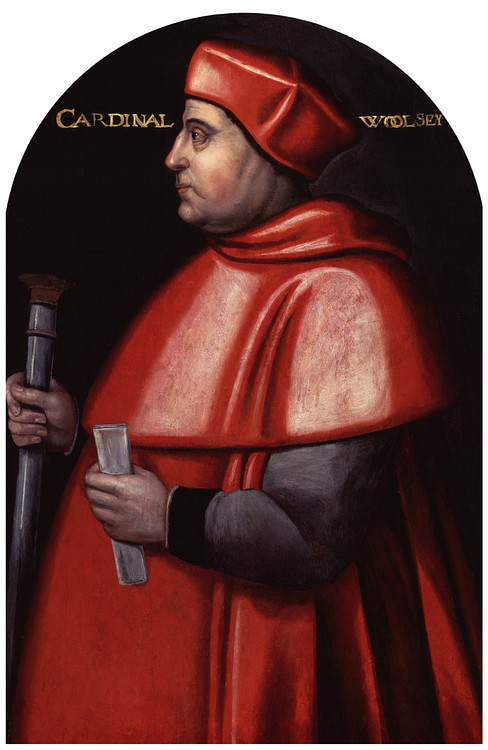
Thomas Wolsey
Thomas Wolsey, Cardinal Archbishop of York (l. c. 1473-1530 CE) served as Lord Chancellor to Henry VIII of England (r. 1509-1547 CE) from around 1513 CE to 1529 CE. Wolsey rose to become the most powerful man in England after the king, he created the Chancery court, worked with some success at England's foreign policy, and famously built Hampton Court Palace near London. Unable to secure from the Pope the annulment of Henry's first marriage to Catherine of Aragon (1485-1536 CE), Wolsey fell out of favour with his friend and monarch. Accused of treason, the cardinal was already seriously ill when he died on his way to imprisonment and trial in November 1530 CE.
Early Life & Rise in the Church
Thomas Wolsey was born c. 1473 CE in Ipswich, the son of a butcher. He studied at university and became the chaplain to Henry VII of England (r. 1485-1509 CE), gaining invaluable experience of Tudor politics from his sponsor, the councillor Bishop Richard Fox (1448-1528 CE). However, it was under Henry VIII that Wolsey's career really took off. Indeed, after being appointed the royal almoner (giver of alms) in 1509 CE and benefitting from the new king surrounding himself with his own advisors rather than his father's, Wolsey enjoyed a meteoric rise to power from 1514 CE. He became the bishop of Lincoln in March 1514 CE and just a few months later, in September, he was appointed archbishop of York and so became the second most powerful church official in England.
Eager to be the top man in England but realising the current Archbishop of Canterbury was secure in his position, Wolsey bypassed him by directly approaching the Pope. In 1515 CE Wolsey became a cardinal and so he now outranked even the archbishop; he was truly a 'prince of the Church.' In 1518 CE Wolsey went one step higher and became a papal legate (legatus a latere), that is a representative of the Pope himself and entitled to make decisions on his behalf. Usually, legates were given their authority for a limited time only and for a specific purpose such as an international conference. In 1524 CE, Cardinal Wolsey was given legate powers for life. Thomas could now really believe that one day, he might even be in a position to grab the very top job of Pope.
Even before these momentous ecclesiastical progressions, and much more importantly for history, Wolsey had become Lord Chancellor around 1513 CE (or perhaps 1515 CE, historians do not agree on the date). In this position, he was, in effect, Henry VIII's sole minister, the very apex of the pyramid of political power in England. Thanks to his administrative skills and good friendship with the king, Wolsey became a giant political spider with a web of subordinates that stretched into every part of the kingdom.
As the historian S. Brigden summarises, Wolsey developed a very special working relationship with his mercurial monarch:
The Council was still consulted, but only after Wolsey and the king, in a kind of partnership, had determined policy. Wolsey would first 'move' Henry towards some idea; the King 'dreamed of it more and more'; and only then would the council be informed. Wolsey's influence seemed supreme, and his household, in its magnificence, looked a rival to the royal court. So completely did he see himself as alter rex, it was alleged, that he would say: 'The King and I would ye should do thus: the King and I do give you our hearty thanks.' His pride and splendour were legendary: crosses, pillars and poleaxes, hated symbols of his authority, were carried before him; earls and lords served him. (106)
Continue reading...
22 notes
·
View notes
Text
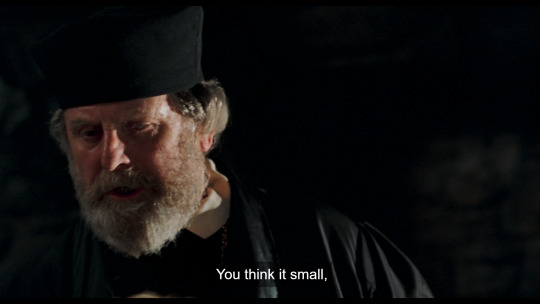
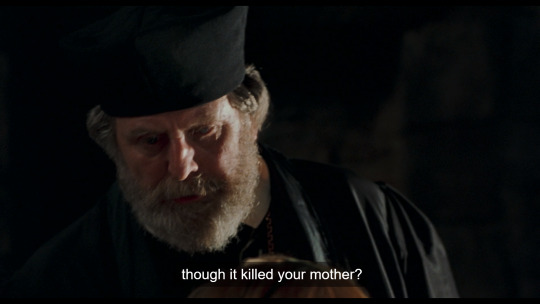

ok, so, i was reading this sort of snark-review of the above movie (which i'm not going to search for because it just overall had little merit, not worth a reread) which cited a specific critique of this above scene ('the matter of religion'), that if elizabeth was told that 'religion' killed her mother her primary response would be confusion, her mother was killed on accusations of adultery, incest, and treason, etc. and also that no one would say this because this obviously was not true.
while technically correct-- obviously the charges leveled against anne were not ones of heresy (although the prevalence of the theory witchcraft was in the suggestion if not literal text of the indictment by 1998 could be the explanation here)-- i would actually defend this creative choice, as a historically sound perception, ie, actually, a sophisticated creative choice in the context of the historical sources available.
protestant martyrologists such as john foxe did rewrite anne into the pantheon of protestant martyrdom, as a symbol if not literal martyr, much like catholic hagiography adopted catherine of aragon as catholic martyr for having suffered for upholding papal primacy, even if not literally dying for this belief as more, fisher, the carthusians, etc. catholic polemicists would not view her as a 'martyr', obviously, but they did view her as a heretic who deserved to die for her heresy among 'other crimes', even if this was not in the official indictment. so, actually... yes, it would be plausible that a marian councilor might threaten elizabeth with the salient reminder that religion 'killed her mother'.
moreover, this movie exists in a post-ives world...it was ives who made mainstream the theory that anne's stance on the dissolution was the catalyst to her downfall, based on strong primary source analysis and timeline recreation of events. after this, we saw a watershed in tudor fiction as it came to portrayals of her... it forced some movement in that binary mold which had existed for so long, anne as either femme fatale or tragic romantic heroine/victim (maybe she was neither of these things, maybe she was, actually, entirely more). in this way, it can be argued, she did 'die for religion'; and even if you disagree, there's still an emotional truth and resonance to this scene (in that this was what certain people believed, whether they cast anne as the heroine or villain of the tale...anne as the victim of a religious conspiracy by 'papists', alexander ales only one among them, anne as the 'wellspring' of 'heresy' in england), even if not a literal paint by numbers 'historical accuracy'.
tl; dr in the words of the immortal florence welch: who's a 'heretic' now?
35 notes
·
View notes
Note
Can you make a christianity and catholicism symbol

"Catholic"
Image: The Catholic emblem of the 'keys of Saint Peter,' a gold and silver key crossed over each other, bound by red thread, with the papal crown placed above them.
#religion#christianity#aac image#communication symbol#aac symbol#communication image#aac emoji#custom emoji
14 notes
·
View notes
Text

“The Path is in yourself, and Truth is in yourself and Mystery is in yourself.” -The Symbolism of the Tarot by P.D. Ouspensky (1913)
V. The Hierophant Talon Abraxas
Significations of The Hierophant
The Hierophant has also been called The High Priest , Spiritual Father, the Abbot, and the Pope. Its correspondence, the High Priestess, is the Abbess or Mother of the Convent. Both are arbitrary names as the insignia of the figures are clearly papal. It stands to reason that the High Priestess is, and can be only be, the Church to whom Pope and priests are married by the spiritual rite of ordination. I think, however, that in its most primitive form this card did not represent the Roman Pontiff.
The Hierophant card has been commonly name The Pope, which is a particular application of the more general office that he symbolizes. He is the ruling power of external religion, as the High Priestess is the prevailing genius of the esoteric, withdrawn power.
This card has suffered from woefully mixed meanings. Grand Orient accurately says that the Hierophant is the power of the keys, exoteric orthodox doctrine, and the outer side of the life which leads to the doctrine. He is not, however, the prince of occult doctrine. The Hierophant is rather the sum of all known spiritual learning, in it’s most rigid expression. He also symbolizes all manifestations of the righteous and sacred. He is the channel of grace belonging to the world of institution as distinct from that of Nature, and he is the leader of salvation for the human race at large.
He is the order and the head of the recognized religious hierarchy, which reflects a greater hierarchic order. There may be times when the pontiff, or bridge-builder, forgets the significance of his symbolic state of being. This will cause him to act as if he contains, within himself, the total sum of divine understanding. The Hierophant does not symbolize philosophy (except theologically). He does not represent inspiration. Most importantly, this figure does not represent religion itself, although, he is a mode of its expression.
-Modern Translation of The Pictorial Key to the Tarot by A.E. Waite (1910)
Significations of The Hierophant
In The Divine = The reflex of the Will; Intelligence In The Human = The reflex of Power; Authority, Religion, Faith In Nature = The reflex of the soul of the world; The Universal Life
20 notes
·
View notes